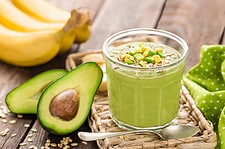Avocados are an extremely versatile and delicious plant-based superfood. Originally from South America, avocados are now grown all over the world and are consumed by many cultures (1).
Avocados are considered to be a fruit, though they’re not typically consumed in the same context as other fruits. Interestingly, avocados are technically in the berry family (2).
Rich in monounsaturated fats, vitamins and minerals, fiber, and antioxidants, avocados are known for their numerous health benefits. Whether you have high cholesterol, type 2 diabetes, or macular degeneration, adding avocados to your diet can improve your health.
In addition, avocados are very versatile in plant-based cooking, providing a rich, creamy texture to various salads, dips, spreads, and dressings. You can even use them to replace the oil in baked goods for a healthier option.
Learn more about the unique nutritional composition and health benefits of avocados below.
Avocado Protein Content
Since avocados are unlike most fruits, many people wonder if avocados are a good source of protein. A whole medium-sized avocado has 3 grams of protein, making it a low-protein food (3).
The average person consumes half of an avocado in a sitting, which is only 1.5 grams of protein (1). The nutritional value of avocados comes primarily from the healthy fats and fiber they contain, along with numerous other beneficial nutrients.
There are many options if you’re looking for ways to add plant-based protein to everyday avocado meals, such as avocado toast.
Choosing a higher protein whole wheat bread is the simplest way to do this. A slice of whole wheat bread can have up to 5 grams of protein, so a breakfast consisting of two pieces of whole wheat bread with one avocado mashed on top provides 13 grams of protein.
Sprinkling 2 tablespoons of hemp seeds on top of avocado toast provides an additional 6 grams of protein. Another tasty option is to mash the avocado with ½ cup of garbanzo beans along with a squeeze of lemon juice, which adds around 7 grams of protein.
If you want to enjoy the health benefits of avocados but dislike their texture, a smoothie is a great option. Adding a small amount of avocado to a smoothie along with fruit, plant-based milk, and plant-based protein powder or peanut butter can make a creamy, protein-rich smoothie that masks the taste and texture of the avocado.
Other Avocado Nutrition Facts
Though avocados aren’t a good source of protein, they are seen as a superfood due to the dense array of other nutrients they provide.
The nutrients in avocados are also very bioavailable, meaning it is easy for the body to absorb and utilize them. The rich fat content of avocados makes fat-soluble nutrients such as vitamin A, vitamin E, and lutein more absorbable (2).
Interestingly, the nutritional content of an avocado can vary based on the type, size, how ripe it is, and where it was grown. For example, a whole avocado can provide anywhere from 140-228 calories (2).
Below you’ll find an overview of the primary nutrients and antioxidants found in avocados. This is based on a nutrient analysis done on one whole medium-sized Hass avocado, the most common variety (3).
- 240 calories
- 3 grams of protein
- 22 grams of fat
- 13 grams of carbohydrates
- 10 grams of fiber
- 0.8 milligrams of iron
- 728 milligrams of potassium
- 122 micrograms of folate
- 3.1 milligrams of vitamin E
- 31.5 micrograms of vitamin K
- 406 micrograms of lutein and zeaxanthin
- 21.3 milligrams of choline
- 93 micrograms of beta carotene
Health Benefits
Avocados are perhaps most well known for their healthy fat content and ability to improve cholesterol levels and reduce cardiovascular risk.
Additionally, avocados have been studied in the context of diabetes, weight management, and cancer. People who regularly eat avocados tend to have better cholesterol numbers, lower weight, and lower rates of metabolic syndrome (1).
Cholesterol
Studies show that regular avocado consumption can lower LDL cholesterol (bad cholesterol) and raise HDL cholesterol (good cholesterol). The cholesterol benefits of avocados come from their rich monounsaturated fat content, which makes up over 70% of the total fat in an avocado (1).
The remaining fat content of avocados comes from polyunsaturated fatty acids and saturated fatty acids. Interestingly, the more ripe an avocado is, the less saturated fat and the more monounsaturated fat it contains (1).
Type 2 Diabetes
Avocados are low in carbohydrates and are an excellent source of fiber, making them a great option for people with type 2 diabetes. A whopping 80% of the carbohydrates in an avocado come from fiber, classifying avocados as a low glycemic food (meaning they do not spike blood sugar levels) (1).
Additionally, studies show that increasing monounsaturated fat intake in the diet can improve insulin function in type 2 diabetes (4).
Weight management
A general misconception is that the high fat content of avocados contributes to weight gain. The research actually shows that moderate-fat diets are effective for weight management.
Avocados have been shown to improve satiety due to the combination of fiber and healthy fats they contain. Specifically, including half of an avocado with a meal reduced hunger and increased satisfaction (1).
Additional benefits
There are numerous additional health benefits of avocados that have been researched. Lutein and zeaxanthin, the primary carotenoids present in avocados, can improve age-related eye conditions (2).
Additionally, these carotenoids have been shown to reduce inflammation and therefore lower the risk of developing osteoarthritis. Preliminary research indicates that avocados may also be beneficial in preventing and treating cancer (1).
Easy Avocado Toast
Ingredients
- 2 Slices multigrain bread
- 1 avocado pitted and peeled
- 1 tsp lemon juice
- 1 pinch cayenne pepper
- 1 pinch sea salt
- ground black pepper to taste
Instructions
- Toast bread slices until golden brown and firm, 3 to 5 minutes.
- Remove the pit from the avocado and scoop out the flesh. Mash avocado in a bowl; stir in lemon juice, cayenne pepper, and sea salt.
- Spread avocado mixture onto toast and serve with your favorite toppings.







